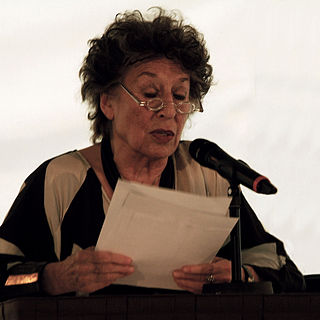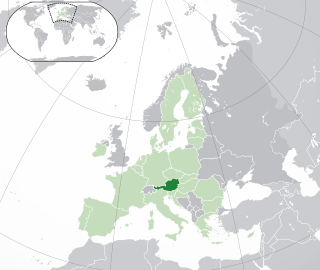
Lea Rosh is a German television journalist, publicist, entrepreneur and political activist. Rosh was the first female journalist to manage a public broadcasting service in Germany and in the 1970s the first anchorwoman of Kennzeichen D, a major political television program. She has been a member of the SPD since 1968.

The history of the Jews in Austria probably begins with the exodus of Jews from Judea under Roman occupation. There have been Jews in Austria since the 3rd century CE. Over the course of many centuries, the political status of the community rose and fell many times: during certain periods, the Jewish community prospered and enjoyed political equality, and during other periods it suffered pogroms, deportations to concentration camps and mass murder, and antisemitism. The Holocaust drastically reduced the Jewish community in Austria and only 8,140 Jews remained in Austria according to the 2001 census. Today, Austria has a Jewish population of 10,300 which extends to 33,000 if Law of Return is accounted for, meaning having at least one Jewish grandparent.
The Reich Representation of German Jews was a Jewish umbrella organization founded in Germany on 17 September 1933. It was established to coordinate and represent the activities of Jewish political and religious groups, with headquarters in Berlin, and provide legal defence in the face of growing persecution of the Nazi era. The organization was constantly being reorganized and remained active in communities nationwide until after the Holocaust. It ceased to exist in June 1943. The Berlin Rabbi Leo Baeck was elected president of the Reichsvertretung with Otto Hirsch acting as its chairman.
Norbert Wollheim was a chartered accountant, tax advisor, previously a board member of the Central Council of Jews in Germany and a functionary of other Jewish organisations.
Jüdischer Kulturbund, or Der Jüdische Kulturbund, was a cultural federation of German Jews established in 1933. It hired over 1,300 men and 700 women artists, musicians, and actors fired from German institutions. According to Jonathan C. Friedman, it grew to approximately 70,000 members, while Saul Friedländer tallies its roster as high as 180,000.
Israelitisches Familienblatt was a Jewish weekly newspaper, directed at Jewish readers of all religious alignments. Max Lessmann and Leo Lessmann founded the Familienblatt, which was published by the printing and publishing house Buchdruckerei und Verlagsanstalt Max Lessmann first in Hamburg, and then in Berlin (1935–1938). The Familienblatt was the only newspaper dealing with majorly Jewish issues in Germany which was run by a private business not aligned to a Jewish organisation of any kind. The editorial and printing offices were located in ABC-Straße 57 in Hamburg. The Hamburg agglomeration, consisting of the Free and Hanseatic City of Hamburg, the Danish-Holsteinian cities of Altona and Wandsbek as well as the Hanoverian city of Harburg upon Elbe, had been an important Jewish centre in Europe and in number with c. 9,000 persons, the biggest in Germany. Only by the first third of the 19th century did Berlin, Prussia's capital, overtake with Jews migrating from the former Polish provinces, which Prussia annexed in the Polish Partitions. Originally directed to readers in Hamburg's metropolitan area the Familienblatt gained more and more readers and spread nationwide in Germany. Israelitisches Familienblatt was prohibited to appear any further after the November Pogroms on 9–10 November 1938.

Inge Deutschkron was a German and Israeli journalist and author. She experienced the Nazi regime as a girl and young woman, living in Berlin first working in a factory, then hiding with her mother.
The Reich Association of Jews in Germany, also called the new one for clear differentiation, was a Jewish umbrella organisation formed in Nazi Germany in February 1939. The Association branched out from the Reich Representation of German Jews established in September 1933. The new Association was an administrative body concerned predominantly with the coordination and support of the emigration and forcible deportation of Jewish people, subject to the Reich government's ever-changing legislation enforced by the RSHA (Reichssicherheitshauptamt). The legal status of the new organisation was changed on 4 July 1939 on the basis of the Nuremberg Laws, and defined by the 10th Regulation to the Citizenship Law issued by the Reich's ministry of the Interior. The Association assumed the so-called oldReichsvereinigung der Juden in Deutschland, which was the name under which the Reichsvertretung der Deutschen Juden had been operating since February 1939.
Manfred George, born Manfred Georg Cohn, later shortened to Manfred Georg, was a German journalist, author and translator. He left Germany after the Nazis came to power, living in several different European countries and eventually emigrating penniless to the United States in 1939. He became the editor of Aufbau, a periodical published in German, and transformed it from a small monthly newsletter into an important weekly newspaper, especially during World War II and the postwar era, when it became an important source of information for Jews trying to establish new lives and for Nazi concentration camp survivors to find each other. George remained Editor in Chief of Aufbau until his death.

Margarete (Grete) Sommer was a German Catholic social worker and lay Dominican. During the Holocaust, she helped keep many Jews from deportation to death camps.

Otto Hirsch was a German Jewish jurist and politician during the Weimar Republic. He was born in Stuttgart, Germany and died in Mauthausen concentration camp.
The Reich Flight Tax was a German capital control law implemented in 1931 to stem capital flight from the German Reich. After seizing power, the Nazis used the law to prevent emigrants from moving money out of the country.

Berthold Guthmann was a German lawyer and First World War veteran. Guthmann, a German Jew, was the secular head of the Jewish community of Wiesbaden in its final years from 1938 to 1942 and was murdered at Auschwitz concentration camp in 1944.

Emigration of Jews from Nazi Germany and German-occupied Europe started after Adolf Hitler came into power in 1933. Jews also began to escape German-occupied Europe.

Salomon Korn is a German architect and an Honorary Senator of Heidelberg University. Since 1999 he has served as Chairman of the Jewish Community of Frankfurt am Main and since 2003 as Vice President of the Central Council of Jews in Germany.

Martha Mosse was a German lawyer who was Prussia's first female teacher at the Berlin Police Headquarters. Because of her Jewish origin, she was given a professional ban during Germany's period under Nazi government and deported in 1943 to the ghetto Theresienstadt, a concentration camp in the Protectorate of Bohemia and Moravia. Mosse survived the Holocaust and was a witness in the Nuremberg trials.
Herbert Arthur Strauss was a German-born American historian.

Margot Friedländer is a German survivor of the Holocaust and public speaker. She and her family were persecuted by the Nazis for being Jews. Born and raised in Berlin, she was forced to go into hiding when her mother and brother were arrested by the Gestapo in 1943. She was captured in April 1944 and deported to Theresienstadt concentration camp, but survived. After emigrating to the United States with her husband in 1946, she eventually returned to live in Berlin in 2010 and began speaking to German youth about her experiences in Nazi Germany. She has received various honours and awards for promoting human rights and fighting against antisemitism, including the Federal Cross of Merit.

Hannah Karminski was a German educator and an important contributor to the Jewish Women's League and the Reich Association of Jews in Germany. She helped many persecuted people to emigrate and was murdered in the Holocaust.












